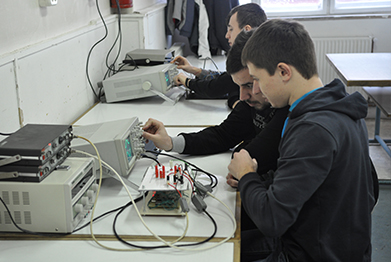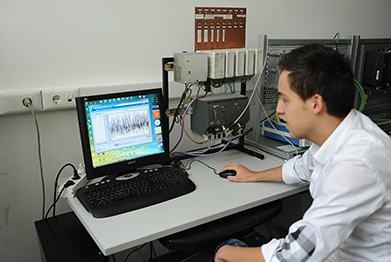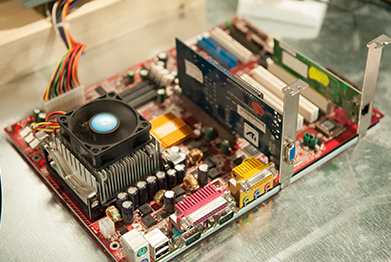Bachelor's degree

The study programme is taught in English and is EUR-ACE labelled. (Details at https://eurace.enaee.eu/node/78626). The bachelor’s study field which this programme belongs to is Electrical Engineering. The duration of studies is 4 years (240 ECTS credits). The completion of this study programme provides specific skills for electrical engineers: adequate application of basic knowledge in electrical engineering, analysis and design of electrical installations, equipment and machines, knowledge and use of software packages for the design of electrical installations, equipment and machines, knowledge of the architecture of computers, peripherals and computer networks, knowledge of measurement techniques for electrical systems, knowledge and application of methods for control and automation of industrial processes.
Perspectives after graduation: electrical engineer, electrical installation designing engineer, electrical machinery and equipment designing engineer, data acquisition processing and measurement engineer, command and control systems designing engineer.

The study programme is EUR-ACE labelled. (Details at https://eurace.enaee.eu/node/77238). The bachelor’s study field which this programme belongs to is Electrical Engineering. The duration of studies is 4 years (240 ECTS credits). Students acquire skills in the design and modelling of electrical and electronic power circuits, in the operation of computer networks, in the development of applications for automation and industrial control. The completion of this program of study enables graduates to approach several professions in the field of engineering, by combining electrical engineering and computer science.
Perspectives after graduation: engineer of operation and maintenance of renewable systems, electrical installations, automation and industrial control in multinational companies due to the English-taught programme.

The study programme is EUR-ACE labelled. (Details at https://eurace.enaee.eu/node/78605).
The bachelor’s study field which this programme belongs to is Electronics, Telecommunications and Information Technologies. The duration of studies is 4 years (240 ECTS credits). A particularity of the programme is the balanced training in the field of hardware and software, in order to design the embedded systems that are currently part of most electronic and computing systems. The main pivot in training consists of subjects related to computer-based systems, around which the subjects of applications are grouped. The completion of this study programme enables graduates to approach the professions in the IT field, which are currently in high demand on the labour market.
Perspectives after graduation: The current development of electronic design and manufacturing companies has led to an increased demand for the graduates of this study programme. Our graduates have the necessary skills to occupy IT engineer positions, both in the hardware and in the software, both in design and in production.

This study programme falls within the bachelor’s field of Electronic Engineering, Telecommunications and Information Technology and is EUR-ACE labelled, (details at https://eurace.enaee.eu/node/24086). The duration of studies is 4 years (240 ECTS credits). Students acquire skills in the analysis, development and management of telecommunications activities, through the use of specific software environments, protocol monitors and emulators for fixed and mobile digital communications, industrial communications and telematics; moreover, they acquire the ability to configure, test, operate and manage communications systems, to develop integrated communications and computer network architectures and plans. The completion of this study programme enables graduates to approach several professions in the field of information and communication technologies (ICT).
Perspectives after graduation: Employment in national and multinational companies in the field of ICT or services - industrial, banking, medical communications, transport, energy; support and maintenance - employment as operators, in consulting companies; or establishment of their own SMEs; employment in special communications - civilian or military, with an emphasis on data security and integrated computer and communications networks.

The study programme is taught in English and is EUR-ACE labelled. (Details at https://eurace.enaee.eu/node/78626). The bachelor’s study field which this programme belongs to is Computers and Information Technology. The duration of studies is 4 years (240 ECTS credits). Students acquire skills in addressing the basic components for software environments: compilers, assemblers, simulators, operating systems, skills in the analysis, design and use of components for programmed electronics: microprocessor, microcontroller, digital signal processors, interfaces, memories and analysis skills, design and experimentation of digital systems, computing systems and embedded systems. The completion of this study programme enables graduates to approach several professions in the IT field.
Perspectives after graduation: The completion of the Computers study programme opens the opportunity to work as a computer designing engineer, computer-aided design specialist, computer researching engineer, computer systems designer, computer systems programmer, system engineer and other IT occupations.

The bachelor’s study field which this programme belongs to is Systems engineering..
The duration of studies is 4 years (240 ECTS credits).
Students acquire skills in the use of computer-aided design techniques or of the design, implementation and maintenance of computer networks for applications of automation and applied informatics.
The completion of this study programme enables graduates to approach the following professions: engineer for the development of automated systems; automation systems and equipment engineer; software development engineer for process management; designer of automated and computer systems.

The general objective of the study programme Information Technology is to train specialists capable of using both hardware and software systems at the highest professional level for the purpose of data acquisition, storage, processing and transfer.
The objectives and the envisaged skills are in line with the needs identified on the labour market and with the national qualifications framework:
This study programme integrates in the bachelor’s field of Computers and Information Technology. The duration of studies is 4 years (240 ECTS credits).

Emerged as the science of design, manufacture and use of universal handling systems - manipulators - robotics has had a spectacular development; nowadays it is seen as the science of intelligent machines, of those technical systems that will be increasingly present in our daily lives.
Robots are now present in industry for the assembly lines, in the structure of numerically controlled cars, in the medical rehabilitation systems, in the automotive industry as a future autonomous vehicle, in the military industry, in the aeronautical industry in the form of unmanned aircraft, in the domestic industry, etc.
This diversity highlights the potential of Robotics: the fact that a specialist in this field will easily find a job, the fact that this profession is open to research, that it is future-oriented.
Objectives
The choice of disciplines has considered the acquisition of practical skills that enable the graduates’ employment in the field of industrial process automation; of theoretical and practical skills that enable the graduate to identify some research fields that can be approached through master's and doctoral studies. The fields of mobile robots (autonomous vehicle) and artificial intelligence are mainly targeted.
Structure
These academic studies have a duration of 4 years (8 semesters) and can be continued with the master’ s degree (2 years) and doctorate. The curriculum is connected through the European Credit Transfer System to the European universities, which enables the inter-university mobility of students.
Facilities
The Robotics study programme benefits from exceptional facilities, which include: industrial robot laboratories, flexible lines laboratory; CAD laboratories; mobile robot laboratories; virtual reality labs, etc.
The bachelor’s study field into which this programme falls is Mechatronics and robotics and is EUR-ACE labelled, (details at https://eurace.enaee.eu/node/75659.. The duration of studies is 4 years (240 ECTS credits).